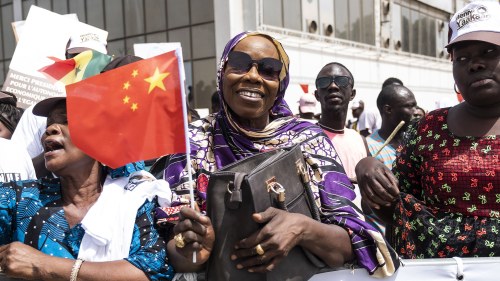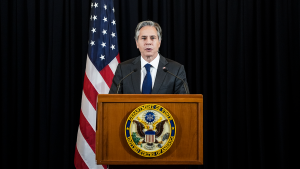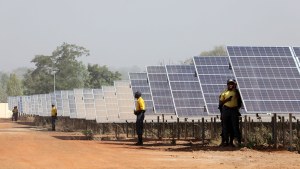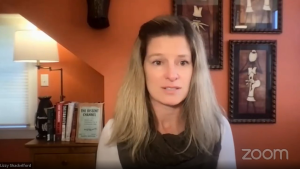How Africans Perceive US-China Engagement on the Continent

As the United States and China compete for influence in the region, two experts weigh in on what Africans would like to see from each potential partner moving forward.
Halfway around the world, Africans today find themselves caught in a byproduct of fraught US-China relations: great power competition. As the United States and China battle for global influence, each propose a separate vision for the continent. Unfortunately, African perspectives on this unpredictable contest are in many cases overlooked.
In an effort to seek a more nuanced view of US-China-Africa relations, the Council spoke with two Global South-based experts: Eric Olander, an American journalist and co-founder of the China Global South Project based in Vietnam, and Géraud Neema, a Congolese analyst and the Francophone Africa editor of the China Global South Project based in Mauritius. Here’s what they had to say not only about the current state of US-China engagement on the continent but where room for cooperation may lie.
How do Africans feel about the revival of great power rivalry?
Géraud Neema (GN): We believe it’s the same old same old. Africans don’t want to pick sides between China and Western countries, we want the freedom to choose. We can’t deny that the amount of money China has spent has changed Africa for the better. Many African countries will say that when we needed money, you [Western countries] weren’t there. China was though, despite the conditions. Moving forward, in terms of values and democracy, the West can serve [as] a model. But when it comes to political stability and governance, we look at China as a model. It’s a buffet, we want to have the best of both worlds.
What is the state of American engagement on the continent?
Eric Olander (EO): Africa was very important to the United States during the Cold War. Now that we’re going back to great power rivalry, scars from that war are still present. When Americans talk about preserving a rules-based order, Africans see an order that hasn’t done much for them. A lot of them would say that very same order that was in place during the Cold War and the economic meltdowns of the 1980s and 1990s didn’t do much for us.
Today, America looks at Africa as a problem. After the Cold War, the United States transformed it into a theater for aid. This was driven by the perception that Africa is a war-torn, HIV-infested, drought-ridden place full of starving babies. The entire apparatus of the US government shifted to the aid approach. Today, we’re still struggling to break out from that thinking. We privatize aid and maintain an aid-industrial complex. Because of that, many people want to see that old system remain in place.
What about Chinese engagement?
EO: Africa is economically insignificant to China; $300 billion in trade is pocket change for the Chinese. The Belt and Road Initiative has changed everything; it has made Africa less essential. Africa isn’t efficient in shipping large quantities of things, but that’s what feeds the Chinese engine. Small countries just can’t provide the scale China needs. In the early phases, Africa was a major export source for raw materials like oil, minerals, and timber. In 2008, 30 percent of China’s imported oil came from three countries: Nigeria, Sudan, and the [Democratic Republic of the Congo]. Today, that number is down to 10 percent. This mirrors trends across many sectors.
Africans themselves are in many ways like an abused spouse. They have been told that the only value you bring to the international system is what you can get out of the ground. The Chinese, however, see them differently. They see them as votes in the UN. The power that Africa has today is political, not economic. Most African stakeholders haven’t made that shift. They could leverage their votes to get more concessions out of the Chinese. Instead, African leaders continue to fumble their policies.
Based on America’s strengths, weaknesses, and engagement thus far, what kind of partner would Africans like it to be moving forward?
GN: Africans expect the United States to be a champion for democracy and a much more coherent partner. Showing respect, understanding how Africa works, acknowledging that Africans have their own agenda and perspective that may contradict US policy, this should be the way the United States behaves in Africa.
What kind of partner would Africans like China to be moving forward?
GN: One of the weaknesses of China’s approach to Africa is its lack of engagement with civil society. China prioritizes relationships with political leaders, but often overlooks civil leaders. When there is a regime change, however, what civil society remembers is that China willingly engaged with dictators and corrupt leaders. For that reason, if China wants a more fruitful and stable relationship, they’ll have to engage more with civil society.
What regional issues would Africans like to see the United States and China cooperate on?
GN: I’d say climate issues. These two countries are top polluters. If instead of working together to find viable solutions they choose to engage in a geopolitical agenda, this won’t help African countries or any other Global South country for that matter. This is one of those issues where there’s no need for a geopolitical agenda.
Africa still has a real need for development financing as well. Unfortunately, this issue is also approached from the angle of geopolitical rivalry, where each side chooses to further its own agenda. The false narrative of debt trap diplomacy is a symptom of that geopolitical rivalry.
Do you believe healthy competition between the United States and China is possible in Africa?
GN: Yes, I do believe healthy competition is possible in Africa, but it will depend on African countries to create the conditions for that healthy competition. A lot of African leaders take advantage of the Sino-Western rivalry to make political gains in line with their domestic needs. Some would play into that unhealthy rivalry to further their own agenda. Good governance in Africa is the prerequisite for healthy geopolitical rivalry in Africa.
Lastly, can American and Chinese policymakers find common ground in their strategies toward Africa?
EO: No, they can’t. There are two committees in Washington that are scrutinizing everything China’s doing. There’s no room in the political space for cooperation with the Chinese. Cooperation implies concession. Nobody’s going to run for office in the United States promising to work with China on climate change in Africa. There’s no constituency in the country that’s going to stand up and lobby for that. In China, it’s the same story.
What Americans fail to understand is that in the developing world, people accept that life isn’t fair. Climate change is going to defecate all over them, and they’ll ultimately pay the price for our excesses. It’s obvious that the United States and China have no incentives to work together, so let’s stop pretending that anything’s ever going to happen. Instead, I’d like to see Africans stand up for themselves and start making threats. African voices need to go to the West and say, “If you’re not going to solve this problem by this date, we’re going to migrate to Europe.” They need to exercise their agency.


Related Content
 US Foreign Policy
US Foreign Policy
Elizabeth Shackleford joins Grid Media to discuss U.S. policy toward Africa, and the balancing act between “not dictating” and effecting change.
 Global Cities
Global Cities
The energy transition in African cities marks a key site of geopolitical competition, as China's control of the solar market reshapes urban service delivery.
 Public Opinion
Public Opinion
Great power competition is the organizing principle of President Biden’s new National Security Strategy. Is the American public on board?
